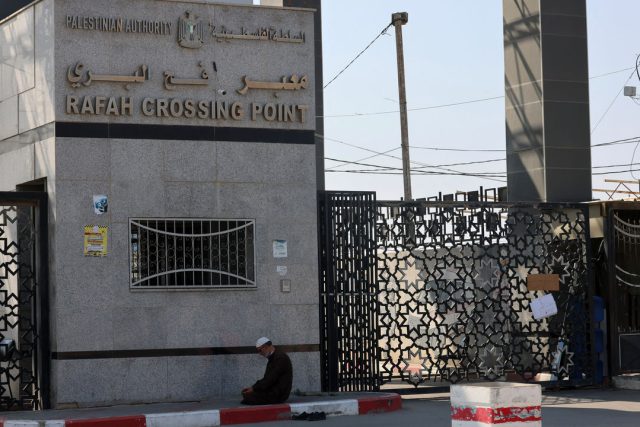A dusty, scuffed slab of concrete is the last hope that many Gazans have of escaping the nightmare which will accompany Israel’s coming ground assault. Cut off from electricity, food imports and water, and under constant bombardment, more than 2,000 people have already been killed and nearly half the population displaced. Gaza’s inhabitants are flooding roads to the south after an Israeli warning to clear the north. Yet the Rafah gate, which punctures the seven-mile-long wall separating southern Gaza from Egypt, and is the only non-Israeli route out of the territory, has been closed since October 7th, when Hamas launched its brutal attack on Israel.
America is reportedly trying to get its own citizens out through the gate; many in the region hope that, to avoid a humanitarian disaster, Mr Sisi might change his mind and allow refugees to flee Gaza. On October 15th Anthony Blinken will arrive in Cairo on a last-minute addition to the American secretary of state’s tour of the Middle East. Could a potential rescue for Egypt’s crisis-stricken economy offer foreign diplomats a means of influence?
Egypt has done such a deal before. In 1991, three months after the Gulf war, America and other Western countries let Egypt off the hook for $10bn of borrowing, which represented a quarter of its external debt at the time. This was also a reward for a geopolitical favour. As other Arab countries amassed troops and watched from Saudi Arabia, Hosni Mubarak, then Egypt’s president, was one of the first leaders to send his armed forces in to join America’s fight against Iraq.
Once again, Egypt’s economy is crumbling. Annual inflation is at 38%, its highest ever; the Egyptian pound is plummeting, as the central bank prints cash to foot the government’s excessive bills from bread subsidies and support for state-owned companies. The imf, which agreed to a $3bn bail-out last December, has refused to hand over the latest two instalments, because it lacks faith its lending will be repaid. From cash injections to cover Cairo’s budget deficit to a deal on imports, there is no shortage of inducements that other countries could offer.
If foreign diplomats are to succeed, there are three challenges they must overcome. One is that Mr Sisi may not be desperate just yet. Egypt’s economy may be struggling, but the government is not in immediate danger of default, as was the case in 1991. It has few big payments to make until 2024 and its $30bn of foreign reserves are sufficient to cover four months of imports.
Another complication is that Egypt currently owes America next to nothing. Most of the country’s borrowing comes from private banks and local-currency bonds, meaning that America could not offer to whittle down its debts. Some diplomats hope that Mr Blinken will instead speed along funds from the imf, or even shave off some of the $16bn Cairo owes the multilateral lender. Yet the fund only offers modest hand-outs, limiting the attractiveness of such an approach. That leaves America one option: pumping new cash into Egypt, which would find opposition in Washington.
A second challenge concerns the countries to which Egypt does owe money. More than half of the country’s external borrowing, and almost all its foreign reserves, come from the United Arab Emirates, Qatar and Saudi Arabia. Each has provided billions of dollars in deposits at Egypt’s central bank; recent packages include $5bn from Saudi Arabia and $3bn from Qatar in November last year. This type of lending can be withdrawn at short notice, and such a withdrawal would be big enough to drain Egypt of dollars. As a result, the Gulf, unlike America, does have leverage with Cairo. Any deals would therefore need the involvement of countries in the region.
Finally, Egypt needs reassurance that it would not be left to deal with Gazan refugees on its own. The worry about letting hundreds of thousands across the border, who will need education, health care and housing, is that they will stay. There is huge uncertainty about when Israel would let Gazans return and what will be left when they do. In Jordan and Lebanon, which took hundreds of thousands from Palestine in the 1940s and Syria in the 2010s, refugees have become a painful political issue. Mr Blinken and Gulf countries would need to convince Egyptian officials that other countries would be willing to pay for, and perhaps even house, some of those who make their way through the Rafah gate. Otherwise Egypt’s economy would struggle to cope, something of which Mr Sisi is all too aware. ■




The Most Read
Сryptocurrencies
Bitcoin and Altcoins Trading Near Make-or-Break Levels
Financial crimes
Thieves targeted crypto execs and threatened their families in wide-ranging scheme
Financial crimes
Visa Warning: Hackers Ramp Up Card Stealing Attacks At Gas Stations
News
Capitalism is having an identity crisis – but it is still the best system
Uncategorized
The 73-year-old Vietnamese refugee is responsible for bringing Sriracha to American consumers
Uncategorized
Electric Truckmaker Rivian, Backed By Amazon, Ford, Raises Whopping $1.3 Billion